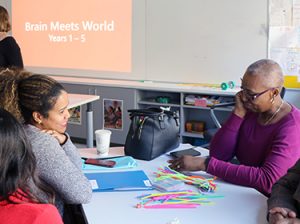 Research shows the earliest years of a child’s life, from birth to age three, are the most crucial in creating the foundation for future learning and behavioral development.
Research shows the earliest years of a child’s life, from birth to age three, are the most crucial in creating the foundation for future learning and behavioral development.
From March 26–28, the Bank Street Graduate School of Education hosted its 32nd Annual Infancy Institute for caregivers, educators, parents, social workers, childcare professionals, and specialists to learn about the latest developments in infant/toddler research, practice, and care. The three-day conference included workshops led by experts in the field, visits to early childhood program sites, presentations on how to support our youngest children, and a keynote address by Margie Brickley, GSE ’89, Program Director, Infant & Family Development at Bank Street, titled “Why Infant Mental Health Begins with our Mental Health.”
In her keynote presentation, Brickley, who is the coordinator of the Infancy Institute, discussed how mental health impacts adults, including caregivers and therefore, their work with children. According to Brickley, adults can provide the best support for infants/toddlers and their social-emotional development when they are wholly present and available in their best and healthiest way.
“In order for us to find our way to being brave in our work, we have to find a way to get ourselves to responsive caregiving. And the way that we do that is by understanding ourselves,” she said. “To bring calm, you need to possess it. In order for us to be brave in our work, we have to be brave about it. Going inside, seeing what’s inside of us, and figuring out how we can become emotionally regulated—and then we can take that bravery out into the world.”
Attendees also gathered for the featured presentation titled, “World Class Trip: Teaching Towards the Global Community” by Dr. Robin Hancock, Director, the Guttman Center for Early Care and Education at Bank Street.
Hancock explored how institutional racism is promoted in early childhood—such as through children’s books—and asked the audience, “How do we interrogate and challenge and disrupt the foundation of institutionalized power and privilege that’s being perpetuated in our classrooms and being enacted on our youngest children?”
Hancock continued, “I would wager that teaching in the form of globalized curriculum pushes back on colonialism that teaches children that they and their culture are only meant to occupy limited spaces in the world…by privileging the stories and experiences of children of color in the classroom to counteract the master script that often others them and confines them to a limited space.”
On Wednesday, the Bank Street Education Center shared their work on a policy focused initiative for 0–3 care and education in a presentation titled, “Creating a Call-to-Action to Support Babies, Toddlers, and their Families” facilitated by Emily Sharrock, Associate Vice President, Strategy & New Program Design and Dr. Sarah M. Semlak, Director of Policy, 0–3 Policy Project.
The conference offered several workshops each day, some of which were presented fully in Spanish (e.g., La Alimentación de los Niños). Topics included: Building and Sustaining a Strength-Based Culture at Your Child Care Setting, Exploring Race & Equity for Infants and Toddlers: A Focus on the Adults who Work With Them, The Intersection of Infant Mental Health and Sensory Processing Disorders, Starting Your Own Family Child Care Business, Creative Art for Toddlers, and STEM or Music? Creating a “Sound” Environment for Infants and Toddlers, among others.
On Thursday morning, attendees had the choice of participating in a workshop or visiting an early childhood program site, including the Bank Street Family Center, Barnard’s Center for Toddler Development, Basic Trust Infant/Toddler Center, and Rita Gold Childhood Center at Teachers College. Each location provided guests with an opportunity to observe high-quality early education in action.
“The site visits let us see all the workshops in action and what it really looks like in the setting,” shared a conference attendee.
To read more about the Infancy Institute and join the mailing list, click here